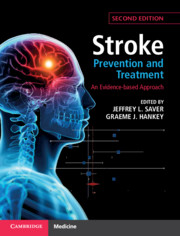Book contents
- Stroke Prevention and Treatment
- Stroke Prevention and Treatment
- Copyright page
- Dedication
- Contents
- Contributors
- Preface
- Part I Foundations
- Part II Systems of Care
- Part III Acute Treatment of Ischaemic Stroke and Transient Ischaemic Attack
- Part IV Acute Treatment of Haemorrhagic Stroke
- Part V Prevention
- Part VI Stroke Rehabilitation and Recovery
- Chapter 23 Evidence-based Motor Rehabilitation after Stroke
- Chapter 24 Language and Cognitive Rehabilitation after Stroke
- Chapter 25 Using Pharmacotherapy to Enhance Stroke Recovery
- Chapter 26 Electrical and Magnetic Brain Stimulation to Enhance Post-stroke Recovery
- Index
- References
Chapter 24 - Language and Cognitive Rehabilitation after Stroke
from Part VI - Stroke Rehabilitation and Recovery
Published online by Cambridge University Press: 15 December 2020
- Stroke Prevention and Treatment
- Stroke Prevention and Treatment
- Copyright page
- Dedication
- Contents
- Contributors
- Preface
- Part I Foundations
- Part II Systems of Care
- Part III Acute Treatment of Ischaemic Stroke and Transient Ischaemic Attack
- Part IV Acute Treatment of Haemorrhagic Stroke
- Part V Prevention
- Part VI Stroke Rehabilitation and Recovery
- Chapter 23 Evidence-based Motor Rehabilitation after Stroke
- Chapter 24 Language and Cognitive Rehabilitation after Stroke
- Chapter 25 Using Pharmacotherapy to Enhance Stroke Recovery
- Chapter 26 Electrical and Magnetic Brain Stimulation to Enhance Post-stroke Recovery
- Index
- References
Summary
Language and cognitive impairments are common consequences of stroke. These difficulties persist with 60% of stroke survivors continuing to experience memory problems, 50% attention deficits and 61% communication problems long after the onset of the stroke-related impairments. Such deficits are ‘invisible’ – evident only through patient report, behavioural observation or formal assessment. The impacts of such deficits are considerable and can include prolonged hospital stays, poorer functional recovery and reduced quality of life. Effective and timely rehabilitation of language (auditory comprehension, expressive language, reading and writing) and cognitive abilities (memory, attention, spatial awareness, perception and executive function) are crucial to optimise recovery after stroke. In this chapter we review the current evidence base, relevant clinical guidelines relating to language and cognitive impairments and consider the implications for stroke rehabilitation practice and future research. Speech and language therapy offers benefit to people with aphasia after stroke; intensive intervention, if tolerated, likely augments the benefits. Interventions for deficits in all non-language cognitive domains exist, but need refining and evaluating more thoroughly with a wider range of methodologies.
Keywords
- Type
- Chapter
- Information
- Stroke Prevention and TreatmentAn Evidence-based Approach, pp. 501 - 516Publisher: Cambridge University PressPrint publication year: 2020

